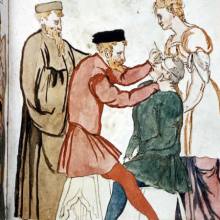
Dionysius “the Renegade” (or “Deserter”), of Heraclea (c. 330 – c. 250 BC) was a heterodox , or maverick, Stoic and presumably initially a student of Zeno, the founder of the school. You can read a short chapter about his life and thought in Diogenes Laertius. Before becoming a Stoic he studied philosophy under the physicist Heraclides of Heraclea, the Megarian philosopher Alexinus of Elis, who we know was critical of Zeno of Citium, and Menedemus, founder of the Eretrian school of philosophy, who appears to have studied under Stilpo and the Megarian school. This tells us Dionysius was an experienced and eclectic student of philosophy before becoming a follower of Zeno, although he also apparently shared with Zeno a background in the Megarian philosophical tradition. We know he also studied poetry and literature and sought to imitate the great Stoic-influenced poet Aratus.
However, we’re told Dionysius broke away from Stoicism after suffering a painful bout of ophthalmia, inflammation of the eyes. He declared that pleasure (hedone) was the true goal (telos) of life and not an “indifferent” as Zeno claimed. His story shows that although Zeno was in a sense a highly eclectic philosopher, and Stoicism apparently tolerated some internal disagreement and debate, belief in the “indifference” of pain was considered an essential doctrine. Once someone rejected that view it no longer made sense for them to call themselves a “Stoic”. This was in part because the doctrine of the indifference of pain was considered so central to Stoicism. However, it was probably also because by arguing that “pleasure” is the true goal of life Dionysius effectively drew closer to the position held by rival schools of philosophy, such as the Cyrenaics and possibly the Epicureans. Dionysius’ story suggests that, like Epicurus, he defined “pleasure” in part as the absence of physical pain.
Indeed, we’re told that Dionysius did leave the Stoa to join the Cyrenaic school following his change of heart. In his chapter on the life of Zeno, Diogenes Laertius says that:
When Dionysius the Renegade asked [Zeno], “Why am I the only pupil you do not correct?” the reply was, “Because I mistrust you.”
This perhaps implies a haughty attitude on the part of Dionysius, who might be taken to be suggesting that his views were above criticism, whereas Zeno’s response takes him down a peg, by suggesting that he is actually beneath criticism.
Diogenes Laertius also includes the following brief reference to Dionysius in a list of Zeno’s most important famous students:
Dionysius, who became a renegade to the doctrine of pleasure, for owing to the severity of his ophthalmia he had no longer the nerve to call pain a thing indifferent: his native place was Heraclea.
We know little more about Dionysius. He wrote two books on freedom from passions (apatheia), two on training exercises (askesis), and four on pleasure (hedone), among others. However, Diogenes Laertius also wrote in his account of Heraclides, the natural philosopher, and former teacher of Dionysius:
Moreover, Dionysius, called the Renegade, or as some say Spentharus [the Spark], wrote a tragedy called Parthenopaeus, and forged the name of Sophocles to it. And Heraclides was so much deceived that he took some passages out of one of his works, and cited them as the words of Sophocles; and Dionysius, when he perceived it, gave him notice of the real truth; and as he would not believe it, and denied it, he sent him word to examine the first letters of the first verses of the book, and they formed the name of Panculus, who was a friend of Dionysius. And as Heraclides still refused to believe it, and said that it was possible that such a thing might happen by chance, Dionysius sent him back word once more, “You will find this passage too:
An aged monkey is not easily caught;
He’s caught indeed, but only after a time.”And he added, “Heraclides knows nothing of letters, and has no shame.”
Discover more from Donald J. Robertson
Subscribe to get the latest posts sent to your email.
